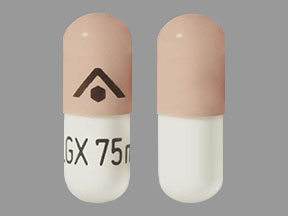Braftovi and Alcohol/Food Interactions
There is 1 alcohol/food/lifestyle interaction with Braftovi (encorafenib).
Encorafenib Food/Lifestyle
Major Food Interaction
GENERALLY AVOID: Coadministration with potent or moderate inhibitors of CYP450 3A4 may significantly increase the plasma concentrations of encorafenib, which is primarily metabolized by the isoenzyme. When a single 50 mg dose of encorafenib (equivalent to 0.1 times the recommended dose) was administered with posaconazole, a potent CYP450 3A4 inhibitor, encorafenib peak plasma concentration (Cmax) increased by 68% and systemic exposure (AUC) increased by 3-fold. When the same dose of encorafenib was administered with diltiazem, a moderate CYP450 3A4 inhibitor, encorafenib Cmax increased by 45% and AUC increased by 2-fold. Increased exposure to encorafenib may increase the risk of serious and life-threatening adverse effects such as hemorrhage, uveitis, QT prolongation, hepatotoxicity, dermatologic reactions, and new malignancies.
MANAGEMENT: Concomitant use of encorafenib with grapefruit or grapefruit juice should generally be avoided. If coadministration is required, the manufacturer recommends reducing the encorafenib dose to one-third of the dose used prior to addition of a potent CYP450 3A4 inhibitor or one-half of the dose used prior to addition of a moderate CYP450 3A4 inhibitor. After the inhibitor has been discontinued for 3 to 5 elimination half-lives, the encorafenib dose that was taken prior to initiating the inhibitor may be resumed.
References (1)
- (2018) "Product Information. Braftovi (encorafenib)." Array BioPharma Inc.
Switch to consumer interaction data
Braftovi drug interactions
There are 631 drug interactions with Braftovi (encorafenib).
Braftovi disease interactions
There are 5 disease interactions with Braftovi (encorafenib) which include:
More about Braftovi (encorafenib)
- Braftovi consumer information
- Check interactions
- Compare alternatives
- Pricing & coupons
- Reviews (1)
- Drug images
- Side effects
- Dosage information
- During pregnancy
- FDA approval history
- Drug class: multikinase inhibitors
- Breastfeeding
- En español
Related treatment guides
Drug Interaction Classification
| Highly clinically significant. Avoid combinations; the risk of the interaction outweighs the benefit. | |
| Moderately clinically significant. Usually avoid combinations; use it only under special circumstances. | |
| Minimally clinically significant. Minimize risk; assess risk and consider an alternative drug, take steps to circumvent the interaction risk and/or institute a monitoring plan. | |
| No interaction information available. |
See also:
Further information
Always consult your healthcare provider to ensure the information displayed on this page applies to your personal circumstances.


